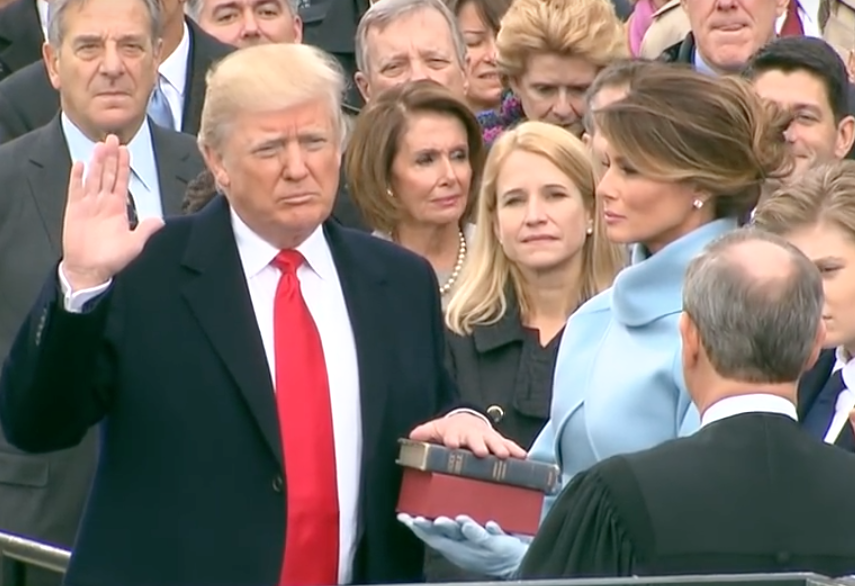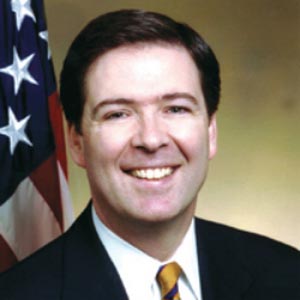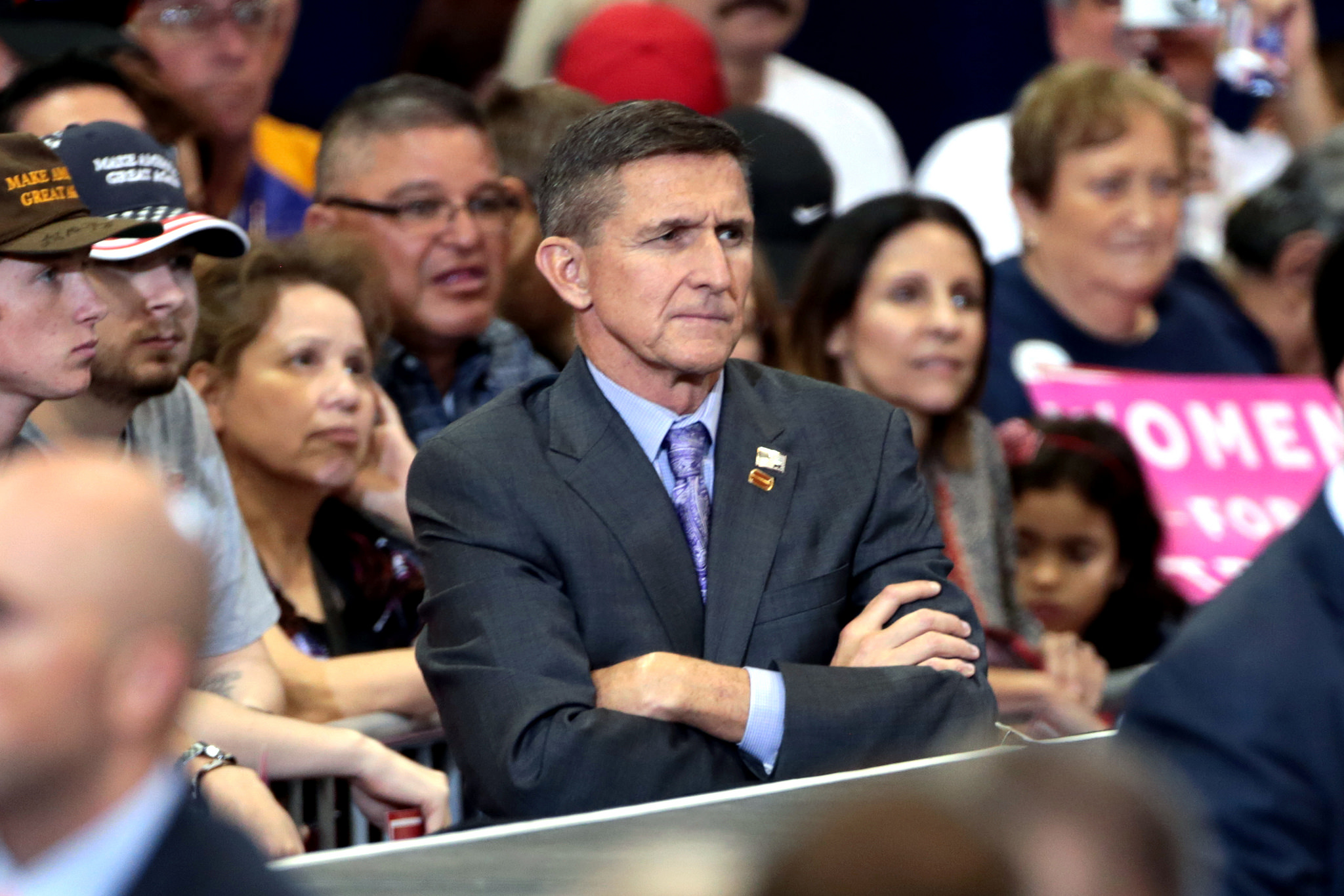
The Push for Trump’s Impeachment
Robert PARRY
The Russia-gate affair has taken a strange turn as advocates for President Trump’s removal say his ouster should take precedence over completing the investigation and actually seeing how much there is there – whereas at least one target of the inquiry wants the U.S. government to put its cards on the table.
President Donald Trump being sworn in on Jan. 20, 2017. (Screen shot from Whitehouse.gov)
Carter Page, a former foreign policy adviser to the Trump campaign who is reportedly under an FBI counterintelligence investigation for his contacts with Russians, has called on Deputy Attorney General Rod Rosenstein, who is overseeing the investigation, to immediately release “any documents related to [the Obama administration’s] alleged wiretapping of me.”
In Page’s view, it was the Obama administration’s spreading of allegations about the Trump campaign’s connections to Russia that represented “government meddling in the 2016 election,” rather than Russia’s alleged hacking Democratic emails and publicizing them via WikiLeaks, a claim made by President Obama’s intelligence chiefs but denied by WikiLeaks and Russia.
Yet, what has been perhaps most remarkable about the entire Russia-gate affair is that it has been conducted with almost no evidence being shared with the American people. Thus, we have the prospect of a duly elected President of the United States being targeted for removal by the political and media Establishment without the citizens being let in on exactly what evidence exists and how significant it is.
The impeachment spotlight has already shifted from the underlying issue of whether the Trump campaign colluded with Russians to President Trump’s inept firing of FBI Director James Comey, who played a key role in sinking Hillary Clinton’s campaign by reopening an investigation into possible security breaches in her use of a private email server while Secretary of State — before Comey took another star turn in pursuing the Trump campaign’s possible ties to Russia.
Trump, whose fitness for the presidency was always a profound concern to many American voters, again displayed his incompetence in firing Comey. You might have thought that Trump — as a former reality-TV star whose trademark line was “you’re fired!” — would have had the process down, but apparently not.
Trump didn’t even fire Comey face to face, but rather clumsily at long distance. Then, Trump had his subordinates justify Comey’s abrupt removal as a response to the FBI director’s violation of Justice Department protocols in announcing the politically sensitive investigation of Clinton in a way that appeared to influence a national election. But Trump undercut that rationale by blurting out comments that seemed to tie Comey’s removal to his lack of loyalty and to the Russian inquiry.
This latest botched move again showed that Trump can’t follow one of the most elementary rules of politics: stick to your own talking points. When one considers what Republicans did with the Obama administration’s initial confusion about the causes for the 2012 attack on the U.S. consulate in Benghazi, Libya, you might think that Trump would have learned the lesson about getting a story straight before telling it, but apparently not.
Whatever the justification for Comey’s firing, what Trump did was shift the Russia-gate “scandal” from the actual facts of the case to the process of the investigation. One of Official Washington’s favorite slogans is “the cover-up is worse than the crime” – although that’s usually a cop-out for journalists and members of Congress who don’t have the skills to investigate the underlying crime or determine if one even exists.
A ‘Soft Coup’
While the Establishment’s outrage over Comey’s firing has been widespread, one might have thought there would be a countervailing concern about the FBI and other U.S. intelligence agencies intervening to affect electoral outcomes, whether that was torpedoing Clinton or now sinking Trump.
The curious role of the Central Intelligence Agency, the National Security Agency and the FBI in spearheading the Russia-gate investigation – including having handpicked “senior analysts” from the three agencies produce a clearly biased and nearly evidence-free report on Jan. 6 – has raised concerns of a “soft coup” or “deep-state coup” to negate the 2016 election.
Considering the seriousness of such a move in a constitutional republic that prides itself as the gold standard of democracy, it might have been expected that that the law-enforcement and intelligence agencies would go the extra mile in sharing their evidence with the American people whose electoral judgment would, in effect, be made meaningless: both by Comey’s late intervention against Clinton and now the pressure to impeach Trump.
Yet, instead of a commitment to openness, the intelligence community is telling the citizens that we must accept the fact of Russian “meddling” as “a given,” sans evidence. In addition, influential voices are emerging to declare that Trump’s impeachment should proceed even without the results of the Russia-gate investigation of possible Trump-Russia collusion being known to the public.
On Sunday, The Washington Post published an opinion article by Harvard University law professor Laurence H. Tribe declaring: “The time has come for Congress to launch an impeachment investigation of President Trump for obstruction of justice… Now the country is faced with a president whose conduct strongly suggests that he poses a danger to our system of government.”
Tribe continued: “Ample reasons existed to worry about this president, and to ponder the extraordinary remedy of impeachment, even before he fired FBI Director James B. Comey and shockingly admitted on national television that the action was provoked by the FBI’s intensifying investigation into his campaign’s ties with Russia.”
Grave Threat
According to Tribe, Trump’s threat to the system is so grave that his removal should precede any conclusions from the Russia-gate investigation. Tribe wrote that immediate impeachment could have been fashioned around other issues, “even without getting to the bottom of what Trump dismissed as ‘this Russia thing’,” though Tribe acknowledged that such an extreme step might have seemed premature at the time.
A wintery scene in Moscow, near Red Square. (Photo by Robert Parry)
“No longer,” Tribe continued. “To wait for the results of the multiple investigations underway is to risk tying our nation’s fate to the whims of an authoritarian leader. Comey’s summary firing will not stop the inquiry, yet it represented an obvious effort to interfere with a probe involving national security matters vastly more serious than the ‘third-rate burglary’ that Nixon tried to cover up in Watergate.
“The question of Russian interference in the presidential election and possible collusion with the Trump campaign go to the heart of our system and ability to conduct free and fair elections.”
Like many mainstream “experts,” Tribe doesn’t seem to understand what Watergate was really about; recent historical discoveries show it to be an outgrowth of Nixon’s cover-up of his 1968 sabotage of President Lyndon Johnson’s Vietnam peace talks, a maneuver that secured Nixon the presidency but extended the war for four more years. Nixon’s fear that his dirty trick might get leaked led to formation of the Watergate “plumbers.”
Tribe also ignores the fact that the “Russian interference” still remains a “question,” not a proven fact, and no investigator has cited any evidence of the Trump campaign’s collusion. To skirt that problem, Tribe focuses on the firing of Comey as the grounds for impeachment:
“To say that this does not in itself rise to the level of ‘obstruction of justice’ is to empty that concept of all meaning. Obstruction of justice was the first count in the articles of impeachment against Nixon and, years later, a count against Bill Clinton. In Clinton’s case, the ostensible obstruction consisted solely in lying under oath about a sordid sexual affair that may have sullied the Oval Office but involved no abuse of presidential power as such.
“But in Nixon’s case, the list of actions that together were deemed to constitute impeachable obstruction reads like a forecast of what Trump would do decades later — making misleading statements to, or withholding material evidence from, federal investigators or other federal employees; trying to interfere with FBI or congressional investigations; trying to break through the FBI’s shield surrounding ongoing criminal investigations; dangling carrots in front of people who might otherwise pose trouble for one’s hold on power.
“It will require serious commitment to constitutional principle, and courageous willingness to put devotion to the national interest above self-interest and party loyalty, for a Congress of the president’s own party to initiate an impeachment inquiry. It would be a terrible shame if only the mounting prospect of being voted out of office in November 2018 would sufficiently concentrate the minds of representatives and senators today.
“But whether it is devotion to principle or hunger for political survival that puts the prospect of impeachment and removal on the table, the crucial thing is that the prospect now be taken seriously, that the machinery of removal be reactivated, and that the need to use it become the focus of political discourse going into 2018.”
Lay Out the Evidence
There is, of course, another alternative: the FBI and other intelligence agencies could expedite whatever investigations they’re doing and let the American people in on the evidence.
Retired U.S. Army lieutenant general Michael Flynn at a campaign rally for Donald Trump in Phoenix, Arizona. Oct. 29, 2016. (Flickr Gage Skidmore)
The key question, as Russia-gate was first being formulated as a political scandal, was whether some member of the Trump campaign colluded with Russian intelligence operatives to deliver, by memory stick or other means, hacked Democratic emails to WikiLeaks.
Yet, beyond the fact that the Jan. 6 report offered no government evidence that the Russians even hacked the Democratic emails, there also seems to be no rush to question the “usual suspects” from the Trump campaign – Roger Stone, Paul Manafort, Michael Flynn and Page – about what they might know regarding the possible delivery of the emails to WikiLeaks.
Nor has there been any public testimony regarding another source of the Russia-gate allegations, ex-British spy Christopher Steele who prepared a series of opposition research reports on Trump and Russia apparently funded by Clinton supporters. It’s still not even known who paid for the Steele dossier.
Typically, the FBI and Justice Department refuse to discuss investigations until they’ve reached a conclusion, but that rule has already been broken by Comey, who justified announcing both the Clinton and Trump investigations because of their political significance.
In the Clinton case, Comey was urged to expedite his work so Clinton could be cleared before the election and he appeared to do so, terminating the reopened investigation of her email server two days before the Nov. 8 election. Today, the public interest in wrapping up the Russian inquiry is arguably even stronger.
In congressional testimony, Comey announced that the FBI began the Russia investigation last July, so it’s not as if the investigators haven’t had time to assess the evidence and decide what to do.
An Open Process
Carter Page’s suggestion – in effect waiving his privacy rights to get out in the open whatever evidence was used by the Obama administration to justify a reported Foreign Intelligence Surveillance Act warrant against him – could be a start.
Former Trump foreign policy adviser Carter Page
Congressional committees also could call as many willing Trump campaign people as possible to testify about their knowledge of any collusion with Russia. So far, the only witnesses have been law enforcement and intelligence officials appointed by President Obama, who have presented various allegations while refusing to offer back-up on the grounds that the evidence is “classified.”
While Professor Tribe and other advocates for impeaching Donald Trump may not care whether the Russia-gate evidence is ever released, they should recognize that – for better or worse – nearly 63 million Americans voted for Trump and – under the U.S. political process – he won the election (although Clinton got about 3 million more votes nationwide).
For the past several days, I’ve been traveling through Trump country of West Virginia, Pennsylvania and Ohio and have talked to several Trump voters along the way. Some indicated that they voted more against Clinton and the “elites” than enthusiastically for Trump. And some criticized Trump for his egotistical excesses. But they wanted him to be given a fair chance to govern.
It’s hard to know how angry these citizens would be if their judgment is overturned by the same “elites” whom they blamed for foisting on them the unpopular choice of Clinton versus Trump.
Reversing – or “correcting” – the result of the presidential election may seem like an obvious move for the editors of The New York Times and for Professor Tribe, but it is a deadly serious proposition that demands as full a release of evidence as possible, not long-running secret investigations or an impeachment based on an alleged “cover-up” of a crime that may or may not exist.
Negating the will of the voters as expressed through the constitutional process – as flawed as that process may be – requires its own process that is perceived as open and fair, not some star chamber or kangaroo court where the intelligence community gets to hide the evidence as “classified” and tells the citizenry to “trust us.”
As unfit and inept as Donald Trump may be, he was elected – and no one should underestimate how dangerous it could be for Washington insiders and other Establishment figures to undo the electoral choice through a process cloaked in secrecy.











/https://www.niagarafallsreview.ca/content/dam/thestar/news/canada/2021/09/25/huawei-executive-meng-wanzhou-receives-warm-welcome-upon-return-to-china/_1_meng_wanzhou_2.jpg)







![]()
No comments:
Post a Comment
Note: Only a member of this blog may post a comment.